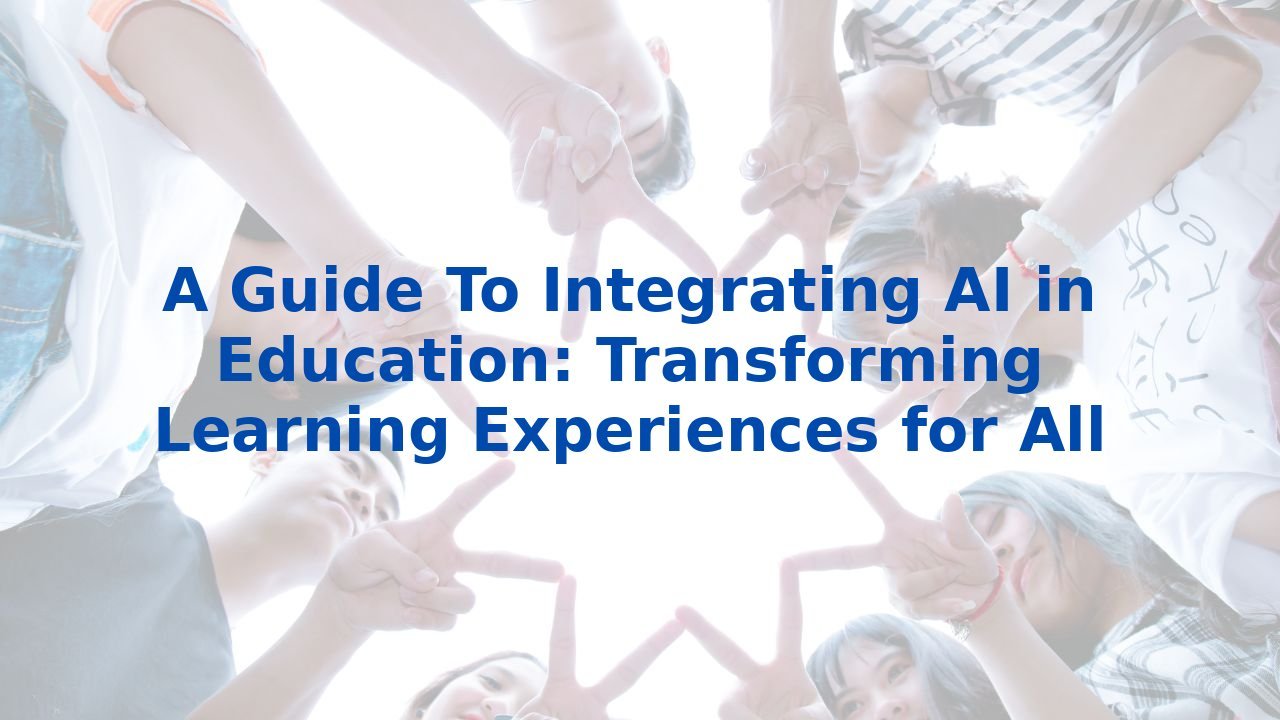A Guide To Integrating AI in Education: Transforming Learning Experiences for All
A Guide To Integrating AI in Education: Transforming Learning Experiences for All
The Future of Education: Embracing AI
As we stand on the precipice of a new era in education, the integration of Artificial Intelligence (AI) invites us to reimagine traditional learning paradigms. This transformative technology holds the promise of revolutionizing the way we approach education, making it more personalized, inclusive, and efficient. Join us on a journey through the potential of AI in education and the myriad benefits it offers to reshape learning experiences for all.
Personalization and Individualized Learning
At the heart of education lies the need for personalized learning. Every student comes with a unique set of strengths, weaknesses, and learning styles. Traditional educational methods often struggle to meet these diverse needs, leading to disengagement among learners. Enter AI—capable of analyzing data to tailor educational programs to each student's requirements. This approach not only enhances individual learning outcomes but also fosters a sense of belonging and motivation among students.
AI Tutoring and Support Systems
Imagine having a tutor that adapts to your learning style in real-time—this is the future AI brings to the tutoring landscape. AI systems can assess a student’s existing knowledge, allowing them to provide targeted instruction and support. Whether a student requires additional help or is ready to tackle advanced materials, AI-powered tools ensure personalized assistance beyond the classroom, cementing continuous learning as a life skill.
Streamlining Grading and Feedback Processes
AI revolutionizes the grading process, transitioning from manual assessment to automated systems that provide instant feedback on student performance. By analyzing responses and identifying patterns, AI systems can deliver nuanced feedback that supports continuous improvement. Additionally, adaptive testing features powered by AI ensure that each learner faces an appropriate level of challenge, promoting engagement and intellectual growth.
Data Analytics for Insightful Learning
In an age where data is king, AI harnesses learning analytics to provide educators with crucial insights into student performance. Through the examination of interactions with digital platforms, AI algorithms unveil patterns that guide instructional strategies. Educators are enabled to make informed decisions that cater to the evolving needs of their students, ultimately creating a more effective learning environment.
Promoting Inclusion and Accessibility
AI does not merely enhance traditional learning; it breaks down barriers like never before. Creating global classrooms, AI offers teaching tools that cater to diverse languages and accessibility needs. Students unable to attend traditional schools due to various factors can access education seamlessly. This approach democratizes learning, ensuring that every individual, regardless of their background, has an equal opportunity to thrive.
Building Capacity and Supporting Innovation
The successful integration of AI requires building capacity within educational institutions. This involves ongoing professional development for educators, empowering them to harness AI tools responsibly. The understanding of AI's impacts, limitations, and ethical considerations is vital in ensuring that technology enhances rather than compromises educational integrity. Supporting research and innovation creates a feedback loop that continually enriches educational experiences.
The Crucial Role of Educators
While AI offers invaluable resources, it cannot replace the irreplaceable: the human touch in education. Educators play a transformative role in guiding students, fostering creativity, and nurturing critical thinking skills. Through meaningful interactions, educators can bridge the gap between technology and human experience, creating a blended learning environment that feels both engaging and grounded.
Investing in AI Training for Educators
A key component in leveraging AI within education lies in the training of employees. Comprehensive training equips educators with the tools they need to utilize AI purposefully and ethically. It not only enhances their understanding of AI's educational applications but also empowers them to ensure student privacy and data security. This investment in human capital amplifies the impact of AI across the educational system, serving communities more effectively.
Conclusion: A Vision for the Future
The integration of AI in education transcends mere technological deployment; it represents a visionary shift toward personalized, inclusive, and empowering learning experiences. By embracing AI, we are not just adapting to change; we are ushering in a new era that prioritizes access, creativity, and the limitless potential of learners. As we journey forward, fostering leadership, promoting AI literacy, and supporting innovation will be imperative to unlock the full potential of AI in education.
If you're ready to transform your organization's approach to education through AI, explore comprehensive training options for your entire workforce. Together, we can pave the way for a brighter, more inclusive educational future.



